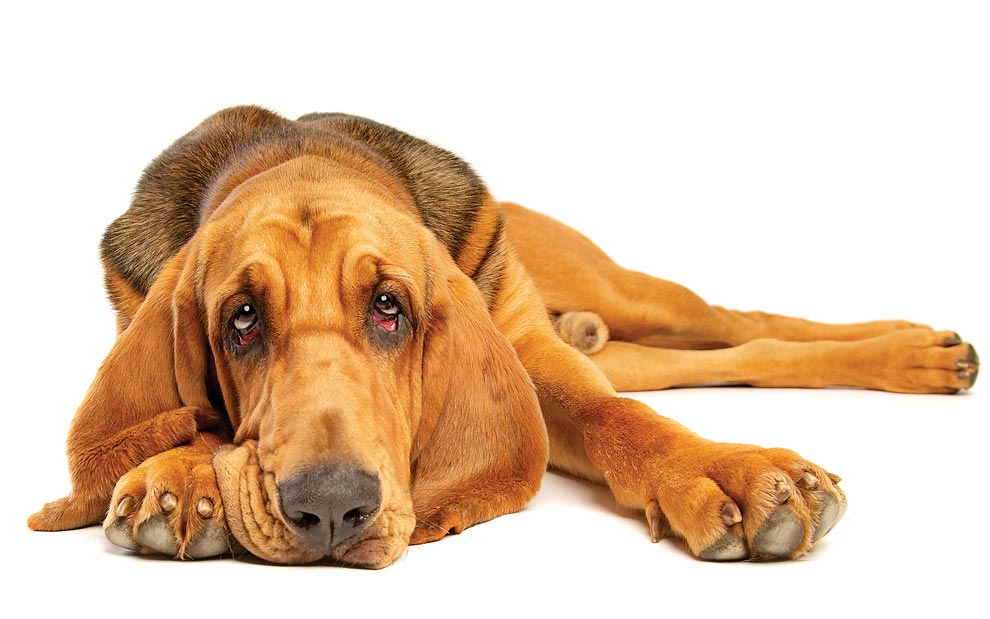Have you ever heard someone say that something smells like a wet dog? Poor pups! They get blamed for a lot. The truth is, your dog should not smell bad. Sure, some of his parts are not going to smell like roses, but generally, a foul odor from your dog is a problem.
Dogs and humans have distinctive scents that are caused by the oils in our skin or what we have eaten. Sniff a dog’s feet and they’re probably going to smell like Fritos or popcorn – not a bad smell, but some people find it offensive. A dog sweats through his feet, and we can pretty much surmise that a sweaty area is not going to have an appealing smell, on people or pets.
However, when you put your nose in your dog’s fur or kiss the top of his head, you should not detect any bad odor. Bad odors can be the sign of a serious problem. There are normal smells that emanate from your dog and other smells that could indicate a problem.
Ear Infections
There are many different reasons dogs have smelly ears, including lack of cleanliness, continual moisture (from swimming, perhaps), excessive hair on top of or inside the ear canal, and others. The degree to which the ears smell is also significant. A light, yeasty smell may mean nothing more than your dog just needs his ears cleaned. An ear infection has a much stronger, sickening smell and calls for a visit to the veterinarian. Stinky and infected ears can often be smelled from a distance, it’s that overpowering.
Skin Issues
Canine seborrhea is a condition that, when not controlled, results in a musty, stinky cheese smell due to the buildup of sebum and yeast on a dog’s skin. Once diagnosed, your dog is put on a regimen of bathing, medicine, and ear cleaning. There is no cure for canine seborrhea, but it can be managed.
Although it is probably one of the most common conditions, canine seborrhea is not the only skin issue that can cause an odor. Allergies, hormonal imbalances, fungus, parasites, and localized inflammation can lead to an overgrowth of yeast or bacteria on the skin and cause an unpleasant smell. Your dog’s discomfort will lead to excessive scratching and licking, which can cause a secondary bacterial infection. A secondary bacterial infection exacerbates the odor. Any unpleasant smell of your dog’s skin should be brought to your vet’s attention before it progresses into something truly damaging.
Many dogs have overlapping folds in the skin: pug, bulldogs, shar-peis, some mastiffs, basset hounds, and others. These folds can retain too much moisture and microorganisms, resulting in the buildup of infection-causing bacteria. Skin folds require consistent cleaning to keep them dry and odor-free. If your dog’s skin appears irritated, red, or smelly around the folds, he may already have dermatitis or an infection. Over-bathing in an attempt to fend off odors can cause your dog to have too little oil, causing skin irritation. Talk to your vet about how to achieve a proper balance to keep your dog’s skin folds healthy.
Bad Breath
Bad breath is normally the result of a build-up of odor-producing bacteria in your dog’s mouth, however, it can be something much worse. Persistent bad breath can be caused by an abnormality in not only your dog’s mouth, but issues with his respiratory system, gastrointestinal tract, or internal organs. Some diseases – namely diabetes, kidney disease, or liver disease – will cause your dog to have bad breath.
Generally, the issue comes from poor dental health, heavy tartar build-up, dental infections, and periodontal disease, none of which should be taken lightly.
Anal Glands
Often described as a fishy odor, the smells that result from a problem with a dog’s anal glands are not for the faint of heart. Anal glands are small secretory glands on both sides of a dog’s rectum. Unfortunately, many dogs seem to have problems with them, causing pain and a nasty odor. Normal, healthy anal glands should not emit an odor detectable by humans. If your dog’s anal glands smell bad, they may need to be expressed, or there could be another problem – both of which will require a veterinary visit.
Gas Attacks
If you’re in a room and people begin talking about dogs, someone will inevitably bring up their dog’s gas. Occasional burping, gurgling, and flatulence are normal, but excessive gas could indicate a problem. A foul, putrid smell is not normal either. When gas is daily and consistent, it could be a sign that something is wrong and you should bring it up with your vet. The solution may be something as simple as a change in food or treats, or as serious as inflammatory bowel disease.
Some dogs are famous for their gas issues – think pugs, bulldogs, and boxers. That’s due to their facial structure. Those adorable squished-up noses cause these breeds to suck in air while they’re eating, leading to too much air in their digestive system. There are tricks to helping these guys consume less air, like raising up their bowls or giving them probiotics. Talk to your vet about possible solutions.
Urinary Tract Infections
If your pup smells like urine, he could have a urinary tract infection. It’s more common than you would think, and it can be miserable. If it is a bladder/urinary tract infection, you will notice other signs, like an increased frequency to go outside, more trips to the water bowl, or straining and even pain when urinating. You may see blood in his urine. Regardless, any abnormal urine odor needs to be discussed with your vet. There are other reasons for a strong urine smell, like kidney stones, diabetes, or some type of fungal infection. All require immediate medical attention.
Lack of Grooming
A dirty dog is a stinky dog! If bathing your dog at home on a regular basis is too much, you should seek out professional grooming services. A trip to the doggy spa is recommended every three to six weeks. Groomers bathe dogs thoroughly, and some will clean ears and brush teeth upon request. Unless your dog has a malodorous problem like the ones we have been discussing, he will smell amazing after a visit to a groomer.
Brushing your dog goes a long way in helping to decrease any unpleasant smells between baths. Brushing gets rid of dirt, pollen, dead skin cells, dried saliva, and anything else hiding out in your dog’s fur. You will probably be surprised at how much better your dog will smell after a simple, but thorough brushing.
And be sure to keep your bedding clean. My dog has a bed in nearly every room of the house (I know, spoiled rotten!). It’s quite a chore to keep all of his beds clean, but it makes a huge difference in not only his smell, but the way the house smells, too. It also helps to wash your dog’s plush chew toys and fleecy ropes. The buildup of saliva on toys can cause your dog’s breath to smell sour.
Wet Dog
Let’s get back to that wet dog thing I mentioned at the beginning. It’s for real! Despite the fact that you wash and brush your dog regularly, microorganisms – think yeast and bacteria – live in your dog’s fur. It’s normal. As long as your dog stays dry, there is no unpleasant smell. But guess what? Those microorganisms leave behind fecal matter (ewww!) or (not as gross) organic chemicals. There is a whole science behind what happens when these organic chemicals get wet, but I’m not a scientist. The simplest explanation I have is that these compounds separate from your dog’s fur when wet, become condensed, and then disperse into the air causing a yucky smell. Towel drying alone won’t fix the smell. He needs to be thoroughly dried, either by the sun or with a blow dryer.
How to Help Your Dog Smell Better
Here are some practical measures to improve your dog’s smell.
1. Keep them clean.
Of course, regular washing and grooming are key to making your dog smell great. Consider their breed with this, however, as some breeds require a bath more often than others. Wash your pup with a specially formulated shampoo for dogs and rinse thoroughly to remove all residue.
Pay particular attention to your dog’s ears and use only a veterinary ear-cleaning solution. Some veterinarians advise flushing the ears with the solution, while others recommend a thorough cleaning only on the outside, visible areas of the ear. Ask your veterinarian what they recommend for your dog.
If your dog’s ears are particularly red, itchy, or it appears your dog is uncomfortable, inform your veterinarian as soon as possible.
2. Prioritize dog dental hygiene.
Dental hygiene is a standard part of a pet’s hygiene that is often overlooked. Using a dog-friendly toothpaste, brush your dog’s teeth regularly. Daily is best, but if your dog is resistant to it, two to three times a week is better than nothing. In addition, offer your pup dental treats or toys designed for oral hygiene. Schedule a professional cleaning by your veterinarian.
3. Optimize their diet.
Lastly, take a close look at your dog’s diet. Not surprisingly, what your dog eats can substantially affect his body odor. Opt for high-quality dog food that is free of fillers and artificial additives. Or enhance your dog’s diet with foods that are rich in omega-3 fatty acids, which can boost coat health.
If you suspect your dog’s diet is the culprit behind the odor, consult your veterinarian for dietary recommendations that can yield positive results.





